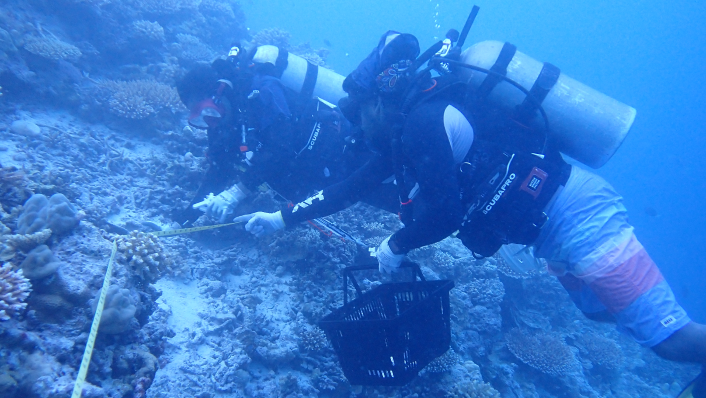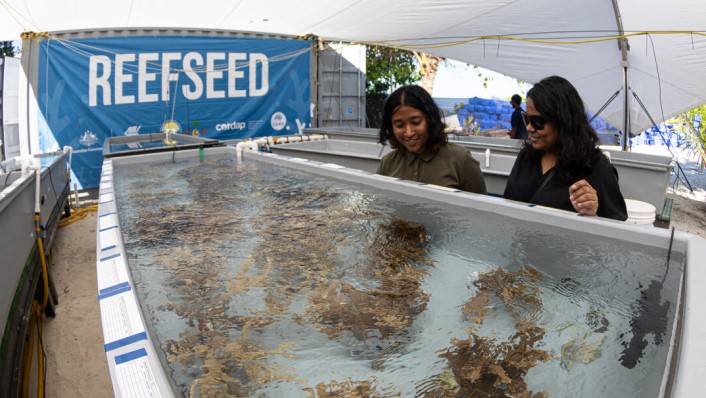A portable reef aquaculture system designed by scientists from the Australian Institute of Marine Science (AIMS) to aid coral reef restoration in remote locations has been successfully road tested in the Maldives by a team of local technicians and biologists.
The Maldives Marine Research Institute (MMRI) employees were trained by researchers from AIMS to assemble and run the self-sufficient system - known as ReefSeed - at Maniyafushi island in the South Malé Atoll, home of the MMRI.
Following coral spawning in April and without AIMS scientists on the ground to provide assistance, the MMRI team used the system independently to rear more than three million larvae from four species of coral, and deploy more than 10,000 juvenile corals on 720 seeding devices at nine reef locations.
AIMS coral reproduction and aquaculture scientist and ReefSeed co-lead, Dr Muhammad Azmi Abdul Wahab said the successful use of the system by MMRI staff was hugely encouraging.

"With training of local experts and technicians, it shows that ReefSeed is a system that could help with coral restoration efforts in remote areas," he said.
"We have learnt much from working with colleagues at MMRI, which will help us make improvements in the training and refinements in the way the system itself can work.
"Coral reefs in the Maldives sustain communities and livelihoods but, like coral reefs globally, they have been impacted by bleaching driven by climate change. Innovations like ReefSeed can play a role in supporting restoration efforts providing hope for these communities.
"AIMS and partners are working on a plan to share ReefSeed with some nations in the Pacific."

AIMS restoration ecologist and ReefSeed co-lead Dr Carly Randall said AIMS scientists and technicians have been working closely with MMRI colleagues since March 2024 to train them on ReefSeed.
"They joined us in early 2024 for autumn spawning and again later in 2024 for the annual mass coral spawning on the Great Barrier Reef. During these visits, we first shared our knowledge of restoration techniques developed and refined by AIMS and put the system through its paces.
"An AIMS team went to the Maldives in March to carry out further training, testing all aspects of the tech and troubleshooting issues. For example, getting the system to send text message alerts to Maldivian phone numbers wasn't straightforward!
"The AIMS team provided support remotely during the April spawning and we are thrilled with the efforts of the MMRI team. They used all areas of ReefSeed, from the autospawners to the larval culture room to the settlement and grow out facility. They also did device assembly using equipment we've developed."
Fathimath Shazra Mueen from MMRI said being involved in the successful ReefSeed process had been incredibly rewarding.
"For the Maldives, a nation on the front lines of climate change and global coral bleaching, this project offers real hope. It's a powerful step towards sustaining our coral reefs for future generations," she said.
"This was our first time operating the ReefSeed system without an AIMS expert on site, which was both exciting and challenging. The experience taught us a lot, and we're better prepared for future spawning events."
The ReefSeed project is a collaboration between AIMS, MMRI and Australia's national science agency CSIRO.
It was awarded US$1.5m (AUD$2.3m) over three years by the G20 Coral Research and Development Accelerator Program (CORDAP), the only international organisation fully dedicated to funding global research and development for tropical and cold water coral restoration and conservation.
ReefSeed uses science and technology developed under the Australian Government's Reef Restoration and Adaptation Program (RRAP).
RRAP is funded by the partnership between the Australian Government's Reef Trust and the Great Barrier Reef Foundation.






